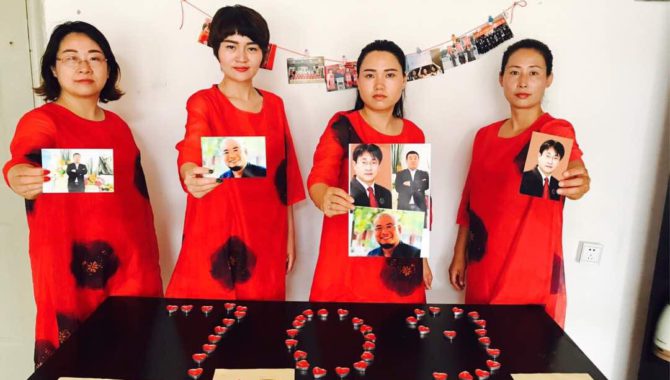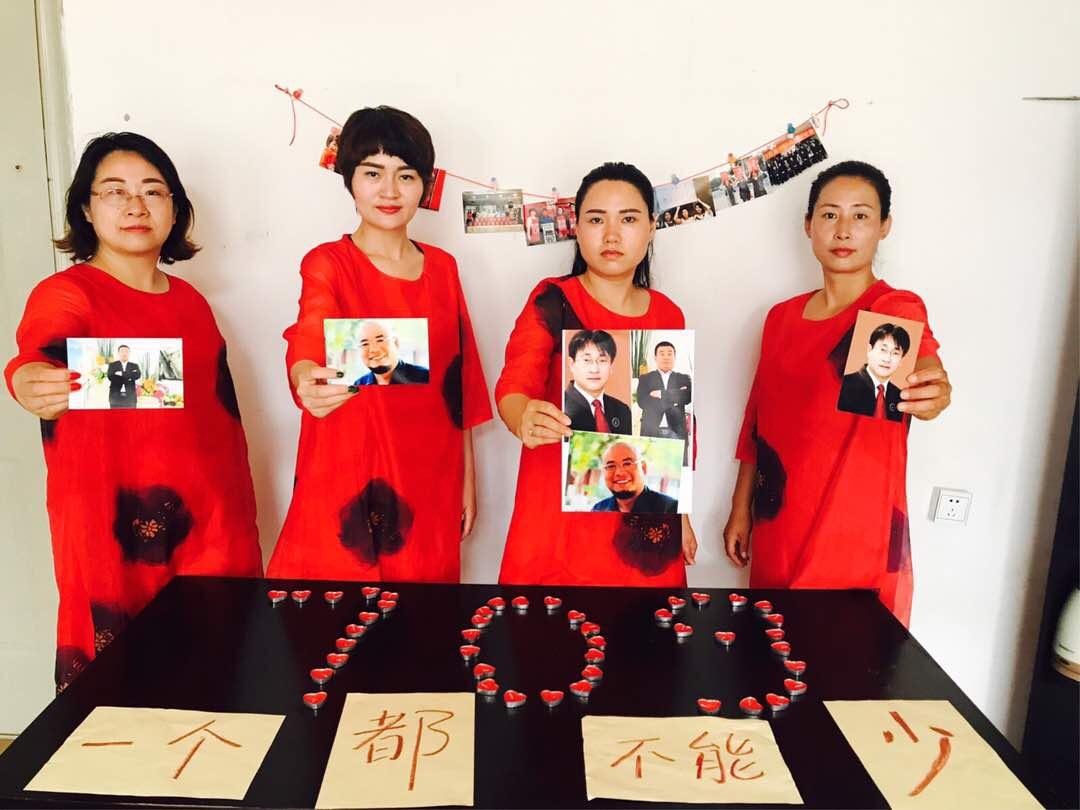End 2-Year Crackdown on Lawyers, Hold Chinese Government Accountable
Comments Off on End 2-Year Crackdown on Lawyers, Hold Chinese Government Accountable
(Network of Chinese Human Rights Defenders – July 6, 2017) – The ongoing persecution of human rights lawyers in China testifies to the Chinese government’s defiance of international human rights standards and its disregard for China’s own Constitution and laws. Known as the “709 Crackdown,” the war that the government has essentially declared on human rights lawyers enters its third year on July 9. The crackdown, which has been replete with torture, disappearance, arbitrary detention, intimidation, and disbarment, makes a mockery of President Xi Jinping’s promise to “rule the country according to the law.” The crackdown also testifies to China’s continuous failure to fulfill its obligations as a member of the UN Human Rights Council.
The UN Human Rights Council, to be a credible international pillar for upholding human rights norms, must investigate accusations that the Chinese government has committed gross and systematic violations of human rights not only in the crackdown but going back decades—in the 1989 Tiananmen suppression, its persecution of “Charter 08” signatories, including jailing its now gravely ill leader, Liu Xiaobo (刘晓波), the Nobel Peace Prize laureate, and depriving his freedom to choose doctors and treatment, as well as ongoing rights abuses in the Tibetan and Xinjiang ethnic minority regions.
The “709 Crackdown” has been characterized by secret detentions and deprivation of the right to access a lawyer of one’s own choice or one hired by their family. We documented 17 individuals put under “residential surveillance at a designated location” (RSDL), a situation tantamount to “enforced disappearance.” In many cases, police have blocked access to a lawyer, claiming visits could “endanger national security” or “hinder investigation,” and authorities reportedly pressured over a dozen detainees to “dismiss” their lawyers and take on government-appointed attorneys. As one example, Wang Quanzhang (王全璋) has not been allowed to see a family-hired lawyer since being seized in August 2015, and a government-appointed lawyer may have been forced upon him. In the event of a trial, it is virtually guaranteed that detainees who have state-assigned lawyers forced on them will not receive a strong defense of their rights, if any at all.
Alleged acts of torture, as revealed either by “709” detainees or by their lawyers or families, reinforce the risk of ill-treatment in secret detention and illustrate China’s disregard for its international commitments. Among the individuals who have allegedly been tortured—to either to force a confession, reveal incriminating evidence, or simply as punishment—are activists Gou Hongguo (沟洪国), Wu Gan (吴淦), and Yin Xu’an, and lawyers Li Heping (李和平), Li Chunfu (李春富), Li Shuyun (李姝云), and Xie Yang (谢阳). CHRD and a group of Chinese civil society groups and lawyers recently submitted a joint report to the UN Committee Against Torture, providing follow-up information on how the government has failed to implement the Convention against Torture.
The government’s use of state media to discredit several “709” detainees as “criminals” has undermined their presumption of innocence and due process rights, and shown that China clearly lacks a system of rule of law. Just two days after the crackdown began, the official Xinhua news agency accused lawyer Zhou Shifeng of running a “criminal syndicate” at Beijing Fengrui Law Firm. Videotaped “confessions” by some detainees—such as lawyers Zhou Shifeng (周世锋), Wang Yu (王宇), and Zhang Kai (张凯), and activist Zhai Yanmin (翟岩民)—appeared on state television or were otherwise publicly released, and were likely products of coercion.

Wives of “709 Crackdown” detainees are on the forefront of advocating for the release of lawyers and activists.
In total, CHRD documented 27 lawyers, paralegals, and activists detained for six months or longer in the crackdown. Of these, six have remained incarcerated since the summer of 2015: three are serving prison sentences; activist Wang Fang (王芳) is awaiting a verdict; and two others, lawyer Wang Quanzhang and activist Wu Gan, have been indicted but not yet tried. The longest punishments handed down so far have been to dissident and writer Hu Shigen (胡石根) and Zhou Shifeng, the director of Fengrui Law Firm, who were given seven-and-a-half and seven years, respectively, for “subversion,” in August 2016. Hubei activist Yin Xu’an (尹旭安) received a three-and-a-half year sentence in May 2017. Of four other individuals who have faced trial, three were issued suspended sentences, and the other was let go on bail without a verdict issued. CHRD has documented 17 individuals “freed” after long periods in custody who immediately disappeared into police control; 11 of them are still under house arrest or otherwise restricted by police in their movement and communications, and are at risk of suffering further abuses.
Despite global condemnation about the crackdown, including from the United Nations and the European Union, the Chinese government has kept up its suppression of human rights lawyers while also denying any “crackdown” is taking place. In fact, high-level officials in China have propagated the narrative that authorities’ treatment of the lawyers is not only legitimate, but laudatory; this past March, the chief justice of the Supreme People’s Court said the “severe punishment” of human rights lawyers was a “key achievement” of the legal system in 2016.
Beyond incarceration, Chinese authorities have employed other means to marginalize human rights lawyers and prevent them from conducting their professional work. Of particular note is the controversial process of annual license renewal for lawyers, which justice bureaus conduct every May. Judicial officials often use the process to punish lawyers for taking on sensitive cases. Lawyers have had their license renewal delayed, holding them in professional limbo, or had their careers ended after officials suspended or permanently revoked their licenses. For example, lawyer Liu Shuqing (刘书庆), who had tried to assist crackdown detainees, had his law license suspended in January 2016. Lawyers Liu Xiaoyuan (刘晓原) and Zhou Lixin (周立新), both from Fengrui Law Firm, have not had their licenses renewed going back to the annual review in May 2016.
Last month, several more rights lawyers reportedly did not “pass” the renewal process, thus leaving them without legal credentials to defend clients. These include three men—Liang Xiaojun (梁小军), Lin Qilei (蔺其磊), and Yu Wensheng (余文生)—who had represented crackdown detainees, and another, Qin Chenshou (覃臣寿), who has defended the recently arrested lawyer Jiang Tianyong (江天勇). Many beleaguered Chinese rights lawyers have taken to pledging not to take part in the annual review, as it has become just another instrument of Communist Party control and government harassment.
China’s persecuted lawyers and other victims of the government’s relentless suppression urgently need the international civil society to step up its ongoing support, including from human rights NGOs, lawyers’ associations, and legal professionals. Such support may be the only hope for the victims and those who take risks to fight for their rights, as even governments in democratic countries and multilateral bodies seem to be increasingly willing to compromise on human rights in exchange for Chinese investment and business or for China’s “cooperation” in matters of regional security.
For more information on the “709 Crackdown” and related human rights issues, see:
Individuals Affected by July 9 Crackdown on Rights Lawyers, CHRD
CHRD Demands Accountability & Justice for Victims of Torture, June 22, 2017
Civil Society Follow-Up Report Submitted to UN Committee against Torture – June 2017
Add your name to the petition: End Torture of Chinese Lawyers
Contacts:
Renee Xia, International Director (Mandarin, English), +1 863 866 1012, reneexia[at]nchrd.org, Follow on Twitter: @ReneeXiaCHRD
Victor Clemens, Researcher (English), +1 628 400 7198, victorclemens[at]nchrd.org, Follow on Twitter: @VictorClemens
Frances Eve, Researcher (English), +852 6695 4083, franceseve[at]nchrd.org, Follow on Twitter: @FrancesEveCHRD
